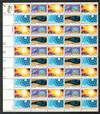
1982 20c Knoxville World's Fair
# 2006-09 - 1982 20c Knoxville World's Fair
$1.50 - $50.00
U.S. #2006-09
20¢ Knoxville World’s Fair
20¢ Knoxville World’s Fair
Issue Date: April 29, 1982
City: Knoxville, TN
Quantity: 31,160,000
Printed By: Bureau of Engraving and Printing
Printing Method: Photogravure
Perforations: 11
Color: Multicolored
City: Knoxville, TN
Quantity: 31,160,000
Printed By: Bureau of Engraving and Printing
Printing Method: Photogravure
Perforations: 11
Color: Multicolored
This series of four commemorates the 1982 fair and its theme, "Energy." Each one of the stamps represents an important energy source: solar, synthetic fuel, nuclear breeder reactor and fossil fuel.
Knoxville World’s Fair
The 1982 World’s Fair was held in Knoxville, Tennessee. More than 11 million visitors passed through its gates, which made it one of the most popular world’s fairs in U.S. history.
The theme of the fair was “Energy Turns the World.” In his presidential proclamation, President Jimmy Carter invited the nations of the world to “think anew of man’s relationship with the pervasive force of energy which fundamentally shapes the choices people have as to the endurance and enjoyment of life itself.” Exhibitors were urged to explore new technologies to conserve energy, to harness long-lasting and renewable sources, and to carry on the search for new sources of energy.
U.S. #2006-09
20¢ Knoxville World’s Fair
20¢ Knoxville World’s Fair
Issue Date: April 29, 1982
City: Knoxville, TN
Quantity: 31,160,000
Printed By: Bureau of Engraving and Printing
Printing Method: Photogravure
Perforations: 11
Color: Multicolored
City: Knoxville, TN
Quantity: 31,160,000
Printed By: Bureau of Engraving and Printing
Printing Method: Photogravure
Perforations: 11
Color: Multicolored
This series of four commemorates the 1982 fair and its theme, "Energy." Each one of the stamps represents an important energy source: solar, synthetic fuel, nuclear breeder reactor and fossil fuel.
Knoxville World’s Fair
The 1982 World’s Fair was held in Knoxville, Tennessee. More than 11 million visitors passed through its gates, which made it one of the most popular world’s fairs in U.S. history.
The theme of the fair was “Energy Turns the World.” In his presidential proclamation, President Jimmy Carter invited the nations of the world to “think anew of man’s relationship with the pervasive force of energy which fundamentally shapes the choices people have as to the endurance and enjoyment of life itself.” Exhibitors were urged to explore new technologies to conserve energy, to harness long-lasting and renewable sources, and to carry on the search for new sources of energy.
















